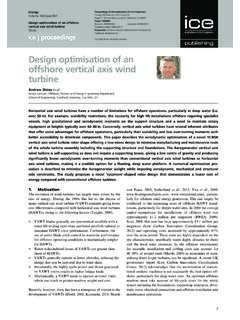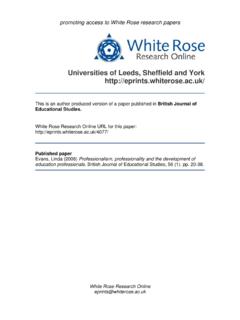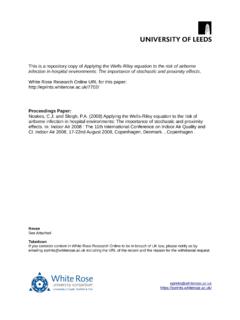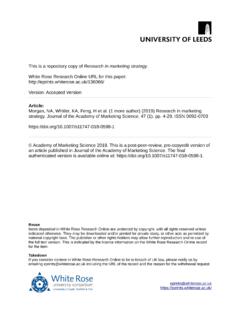Transcription of Scoping studies: towards a methodological framework
1 Article accepted by: International Journal of Social Research Methodology: Theory & Practice This is an electronic version of an article published in Arksey, H. and O'Malley, L. (2005) Scoping studies : towards a methodological framework , International Journal of Social Research Methodology, 8, 1, 19-32. The International Journal of Social Research Methodology is available online at: Open URL link to the article: Scoping studies : towards A methodological framework Dr Hilary Arksey Dr Lisa O Malley Social Policy Research Unit Centre for Housing Policy University of York University of York Heslington Heslington York York YO10 5DD YO10 5DD Tel.
2 01904 433608 Tel. 01904 433691 Fax. 01904 433617 Fax. 01904 432318 E-mail. E-mail. Bionotes Hilary Arksey is Research Fellow in the Social Policy Research Unit at the University of York, Heslington, York, YO10 5DD. E-mail address: Her research interests include informal care, employment and disability and research methods. Her most recent book (co-authored with Peter Knight) is Interviewing for Social Scientists: An Introductory Resource with Examples (Sage Publications; 1999). Lisa O Malley is a Research Fellow in the Centre for Housing Policy at the University of York, Heslington, York, YO10 5DD.
3 E-mail address: Her research interests include research methods; the Internet, health and social policy; and the voluntary sector. 1 Abstract This paper focuses on Scoping studies , an approach to reviewing the literature which to date has received little attention in the research methods literature. We distinguish between different types of Scoping studies and indicate where these stand in relation to full systematic reviews. We outline a framework for conducting a Scoping study based on our recent experiences of reviewing the literature on services for carers for people with mental health problems. Where appropriate, our approach to Scoping the field is contrasted with the procedures followed in systematic reviews. We emphasise how including a consultation exercise in this sort of study may enhance the results, making them more useful to policy makers, practitioners and service users.
4 Finally, we consider the advantages and limitations of the approach and suggest that a wider debate is called for about the role of the Scoping study in relation to other types of literature reviews. 2 Introduction As the drive towards evidence-based practice has gathered pace, increasing numbers of systematic reviews reporting on the effectiveness of treatments and procedures have been published by, for example, the Cochrane Collaboration, an international body supported in the UK by the UK Cochrane Centre based in Oxford, and the NHS Centre for Reviews and Dissemination (CRD) at the University of York. The methodology for conducting full systematic reviews in the area of health care, education and criminal justice has progressed considerably, and guidelines for those conducting reviews are now available (CCEPP 1996, CRD 2001).
5 Currently, techniques are being developed within the social policy and social care field by organisations such as the Campbell Collaboration, the Evidence for Policy and Practice Information and Co-ordinating Centre (EPPI-Centre), and the ESRC UK Centre for Evidence Based Policy and Practice (EBPP). This rapid growth in undertaking reviews of the literature has resulted in a plethora of terminology to describe approaches that, despite their different names, share certain essential characteristics, namely collecting, evaluating and presenting the available research evidence. The following lists some of the labels in current usage: (full) systematic review; meta-analysis; rapid review; (traditional) literature review; narrative review; research synthesis; and structured review. There do not appear to be any consistent definitions of these different review animals , with the result that researchers may use labels loosely.
6 For instance, there is a risk that reviews defined by their authors as systematic may not all adopt the same high standards in terms of protection against bias and the quality assessment for the selection of primary 3research. On this basis the correct label would be literature review and not systematic review . The Scoping study comprises a further type of literature review, yet until recently much less emphasis has been placed on the Scoping study as a technique to map relevant literature in the field of interest. So what might we consider to be the main differences between a systematic review and a Scoping study? First, a systematic review might typically focus on a well defined question where appropriate study designs can be identified in advance whilst a Scoping study tends to address broader topics where many different study designs might be applicable.
7 Second, the systematic review aims to provide answers to questions from a relatively narrow range of quality assessed studies , whilst a Scoping study is less likely to seek to address very specific research questions nor, consequently, to assess the quality of included studies . It is our contention that greater clarity regarding the terminology and methods that surround literature reviews will assist researchers in identifying when and how such reviews might be undertaken. Whilst criticisms have been levied at both traditional and systematic review methods we contend that there is no single ideal type of literature review, but rather that all literature review methods offer a set of tools that researchers need to use appropriately. To that end the Scoping study is one method amongst many that might be used to review literature.
8 Our framework aims to clarify when a Scoping study might be an appropriate method to adopt and how we might go about undertaking this kind of literature review. 4To date, little information is available about how to undertake a Scoping study, as those Scoping reviews that have been conducted tend not to provide detailed information (Hagell and Bourke Dowling 1999, Jepson et al. 2001). This paper attempts to address the current gap in knowledge about Scoping studies . Where appropriate, comparisons are made with systematic review methods. We provide a model for those wishing to scope the field of interest based on our experiences of Scoping published and unpublished literature for a study of services to support carers for people with mental health problems. The paper is organised as follows.
9 First, we present an overview of Scoping studies , contrasting this approach to reviewing the literature with that of systematic reviews. We go on to outline the different stages of a framework for a Scoping study, including discussion of the advantages of including a consultation exercise. We conclude by exploring some of the advantages and limitations of the Scoping study approach to reviewing the literature. What is a Scoping study? Definitions of Scoping studies are few and far between. At a general level, Scoping studies might aim to map rapidly the key concepts underpinning a research area and the main sources and types of evidence available, and can be undertaken as stand-alone projects in their own right, especially where an area is complex or has not been reviewed comprehensively before (Mays et al.)
10 2001: 194; emphasis in original). Whilst this definition draws attention to the need for comprehensive coverage (breadth) of available literature, there may be quite different degrees of depth 5(amount of information extracted from studies and subsequently reported) covered in different kinds of Scoping study. The extent to which a Scoping study seeks to provide in-depth coverage of available literature depends on the purpose of the review itself. It is possible to identify at least four common reasons why a Scoping study might be undertaken: 1. To examine the extent, range and nature of research activity This type of rapid review might not describe research findings in any detail but is a useful way of mapping fields of study where it is difficult to visualise the range of material that might be available.











